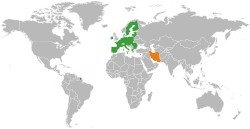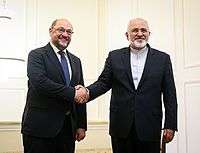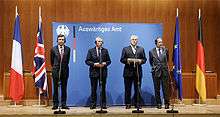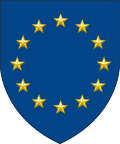Iran–European Union relations
Iran–European Union relations are the bilateral relations between Iran and the European Union (EU). The EU is Iran's largest trading partner, along with China and the United Arab Emirates. Trade with Iran is subject to the general EU import regime and the EU supports the goal of Iranian accession to the World Trade Organization (WTO).[1] The EU has accused and criticized Iran for human rights violations, which led to diplomatic tensions, but both sides aim at improving and normalizing relations.
 | |
EU |
Iran |
|---|---|
| Envoy | |
| Josep Borrell | Javad Zarif |
As of 2019, the Iran–EU trade relations are stained due to the sanctions re-imposed on Iran by the United States after the US unilateral withdrawal from the multinational Joint Comprehensive Plan of Action agreement. The EU has, however, established a special Instrument in Support of Trade Exchanges to enable EU–Iran trade bypassing the US sanctions. In fact, the EU were seen to be "urging Chinese and Russian counterparts to do more to support bilateral economic ties with Iran".[2]
Comparison
| Population | 447,206,135[3] | 83,183,741 |
| Area | 4,324,782 km2 (1,669,808 sq mi)[4] | 1,648,195 km2 (636,372 sq mi) |
| Population Density | 115/km² (300/sq mi) | 48/km2 (124.3/sq mi) |
| Capital | Brussels (de facto) | Tehran |
| Global Cities | Paris, Rome, Berlin, Vienna, Madrid, Amsterdam, Athens, Dublin, Helsinki, Warsaw, Lisbon, Stockholm, Copenhagen, Praha, Bucharest, Nicosia, Budapest, Sofia, Bratislava, Zagreb | Tehran, Tabriz, Urmia |
| Government | Supranational parliamentary democracy based on the European treaties[5] | Unitary Khomeinist presidential Islamic republic |
| First Leader | High Authority President Jean Monnet | President Abolhassan Banisadr |
| Current Leader | Council President Charles Michel Commission President Ursula von der Leyen |
President Hassan Rouhani First Vice President Eshaq Jahangiri |
| Official languages | 24 official languages, of which 3 considered "procedural" (English, French and German)[6] | Persian |
| Main Religions | 72% Christianity (48% Roman Catholicism, 12% Protestantism, 8% Eastern Orthodoxy, 4% Other Christianity), 23% non-Religious, 3% Other, 2% Islam |
99% Islam, 0.9% Christianity, 0.03% Zoroastrianism |
| Ethnic groups | Germans (ca. 80 million), French (ca. 67 million), Italians (ca. 60 million), Spanish (ca. 47 million), Poles (ca. 46 million), Romanians (ca. 16 million), Dutch (ca. 13 million), Greeks (ca. 11 million), Portuguese (ca. 11 million), and others |
61% Persian, 16% Azerbaijani, 10% Kurd, 6% Lur (incl. Bakhtiari), 2% Turkmen and other Turkic tribes, 2% Baloch, 2% Arab, 1% Other |
| GDP (nominal) | $16.477 trillion, $31,801 per capita | $458.500 billion, $5,506 per capita |
History

.jpg)
In December 2013, eight representatives of the European parliament were on an official visit to Tehran to improve relations between Iran and the European Union. The delegation for relations with Iran was under the leadership of the Finnish politician Tarja Cronberg. A number of different talks and meetings were held, first with Fatmeh Rahbar, a conservative member and Chairman of Women Fraction of the Iranian Parliament and later with human rights lawyer Nasrin Sotudeh and film producer Dschafar Panahi, both recipients of the Sakharov Prize in 2012. The talks were however criticized by German political figures, including Markus Löning, Commissioner for Human Rights Policy and Humanitarian Aid of the German foreign ministry, due to the ongoing human rights abuses by the Iranian government and continued executions of accused criminals. The last meetings took place six years ago and several previous attempts failed to reinitiate such talks with Iranian officials and representatives of Iranian culture. Serious criticism was also voiced by the American Jewish Committee.[7]
Iranian nuclear program

The EU supports the Treaty on the Non-Proliferation of Nuclear Weapons, which entered into force on 5 March 1970. Iran ratified this treaty assuring the international community that it will use nuclear energy for peaceful purposes.
In 2003, it was discovered by the International Atomic Energy Agency (IAEA) that Iran is conducting secret activities with nuclear materials. Iran's refusal to cooperate proactively with the IAEA and its resistance to report to the United Nations Security Council (UNSC) led to a diplomatic effort by the European council and its three members France, Germany and the United Kingdom to resolve this issue through negotiations. They were joined in 2004 by the EU High Representative, and thus offering support by all EU members. Subsequently, in 2005 and 2006, extensive proposals to facilitate peaceful nuclear energy usage were again presented to the Iranian authorities. Even with the support of China, Russia and the United States through these proposals, Iran could not be convinced to follow the requests by the IAEA. As a result, four resolutions (N° 1696, 1737, 1747 and 1803) were put in place by the United Nations Security Council: they demanded to suspend all Uranium-235 enrichment and heavy water activities and restricted acquisition of nuclear and ballistic materials by Iran. Those policies were reiterated in 2008 by the EU.[8]
The continuing refusal by Iranian authority to make clear declarations and to allow sufficient inspections of their nuclear facilities then convinced the EU to enforce additional sanctions on civilian goods and services such as financial activities and energy sector technologies. In 2012, an oil embargo and restrictive financial boycotts were enforced by the EU, in addition to UN sanctions against Iran. It was not until December 8, 2013, when Iranian authorities based on a historic deal reached in Geneva on November 24, 2013 with the so-called P5+1 group (Britain, China, France, Russia, the United States, and Germany)[9] allowed UN nuclear inspectors to visit a heavy water facility after announcing that plutonium enrichment has been suspended.[10] The deal puts Uranium enrichment by Iran on hold for at least eight months, and is paving the way for direct talks between the US and the Islamic Republic. Additionally, Iran is required to dilute existing enriched Uranium stockpiles to a concentration of 20%. While the economic boycotts and material restriction are still in place, a step by step reduction of these embargoes by the EU will likely be implemented.
In 2015, Iran reached the Joint Comprehensive Plan of Action agreement on the Iranian nuclear program in Vienna on 14 July, 2015, with the P5+1 (the five permanent members of the United Nations Security Council—China, France, Russia, United Kingdom, United States—plus Germany), and the European Union. This enabled Iran to normalize its trade relations with the EU. in 2019, United States unilaterally abandoned observing the agreement and unilaterally reimposed sanctions against Iran, which was described by then-British Ambassador to the United States Kim Darroch as "diplomatic vandalism".[11] The EU established the Instrument in Support of Trade Exchanges to bypass the reimposed US sanctions.[12]
Trade
In 2008 Iranian exports to the EU amounted to €11.3 billion and imports from the EU amounted to €14.1 billion. EU exports to Iran are mainly machinery and transport (54.6%), manufactured goods (16.9%) and chemicals (12.1%).[13] In 2011, Iran ranked 7th in exporting crude oil to Europe and a Eurostat report stated that 27 European states imported 11.4 billion Euros of goods from Iran in the first nine months of 2011.[14] There is significant room for growth, though this is hampered by the nuclear dispute. A Trade and Cooperation Agreement was installed in 2002 but has been on hold since 2005 because of the dispute. There are no bilateral treaties as Iran is not a member of the WTO.[13] On June 23, 2016, the United Kingdom voted to leave the European Union, a move which was praised by senior Iranian officials as a potential gateway for trade expansion with Europe.[15]
European sanctions do not affect Iran's electricity exports, which creates a loophole for Iran's natural gas reserves.[16]
At the sixth Iran-Europe Banking and Business Forum in Tehran in April 2018, Iran's outgoing ambassador to Germany Ali Majedi announced that Middle East Bank, Saman Bank, and Sina Bank were planning to open branches in German cities to increase Iran's trade relations with Europe.[17]
On 20 October 2018 Association of German Banks stated that exports from Germany to Iran has reduced to 1.8 billion Euros since January.[18] In 2019, the Instrument in Support of Trade Exchanges has become the main vehicle for EU–Iran trade bypassing the US sanctions.
Sanctions
EU–Iran relations have been strained in the early 2010s by the dispute over the Iranian nuclear program. The European Union along with United States have imposed sanctions against Iran over the controversies around Iranian nuclear program. These sanctions which have been described as the toughest EU sanctions imposed against any other country by European officials were last strengthened on 15 October 2012 within by the EU Council.[19][20]
On 23 January 2012, the Council of the European Union released a report in which it restated its concerns about the growth and nature of Iran's nuclear programme.[21] As a result, the Council announced that it would levy an embargo on Iranian oil exports. Further, it stated that it would also freeze assets held by the Central Bank of Iran and forestall the trading of precious metals and petrochemicals to and from the country.[22] This replaces and updates the previous Council Regulation 423/2007 that was published on 27 July 2010. The new sanctions put restrictions on foreign trade, financial services, energy sectors and technologies and includes a ban on the provision of insurance and reinsurance by EU insurers to the State of Iran and Iranian owned companies.[23] Iran has since declared its intentions to close the Strait of Hormuz should the embargo be enacted.[24] At the time, the European Union accounted for 20% of Iran's oil exports, with the majority of the remaining being exported to Asian countries such as China, Japan, India, and South Korea.[25] Current oil contracts will be allowed to run until July 2012.[26]
In response to the sanctions, Ramin Mehmanparast, representative for Iran's foreign ministry, stated that the embargo would not significantly affect Iranian oil revenues. He further said that "any country that deprives itself from Iran's energy market, will soon see that it has been replaced by others."[27]
In addition, Iran's parliament is considering a law that would pre-empt the EU ban by cutting off shipments to Europe immediately, before European countries can arrange alternate supplies.[28]
SWIFT Sanctions
On 17 March 2012, following agreement two days earlier between all 27 member states of the Council of the European Union, and the Council's subsequent ruling, the SWIFT electronic banking network, the world hub of electronic financial transactions, disconnected all Iranian banks from its international network that had been identified as institutions in breach of current EU sanctions, and that further Iranian financial institutions could be disconnected from its network.
See also
- Foreign Direct Investment in Iran
- France–Iran relations
- Germany–Iran relations
- Iran–Italy relations
- Iran–Spain relations
- Iran–Netherlands relations
- Iran–Poland relations
- Bulgaria–Iran relations
- Greece–Iran relations
- Finland–Iran relations
- Iran–Poland relations
References
- http://ec.europa.eu/trade/policy/countries-and-regions/countries/iran/
- Batmanghelidj, Esfandyar (17 May 2019). "China Restarts Purchases of Iranian Oil, Bucking Trump's Sanctions". CCI Ltd. Bourse & Bazaar.
- "Population on 1 January". Eurostat. European Commission. Retrieved 9 March 2015.
- "Field Listing – Area". The World Factbook. Central Intelligence Agency. Retrieved 9 March 2015.
- "Archived copy". Archived from the original on January 21, 2015. Retrieved 2015-01-21.CS1 maint: archived copy as title (link)
- "European Commission - PRESS RELEASES - Press release - Frequently asked questions on languages in Europe". europa.eu. Retrieved 24 June 2017.
- M. Krauss (Dec. 2013). Zum Talk nach Teheran. Abgeordnete des Europaparlaments zu Gesprächen im Iran (in German). Jüdische Allgemeine/Politik. Retrieved 25 December 2013.
- European Union External Action. Iran's nuclear programme. Retrieved 26 December 2013
- Iran, World Powers Reach 'Historic' Nuclear Agreement. Radio Free Europe Radio Liberty. Retrieved 26 December 2013.
- In wake of Geneva deal: UN nuclear inspectors begin rare visit to Iran nuclear facility. Haaretz December 8, 2013.
- New leak claims Trump scrapped Iran nuclear deal 'to spite Obama'. BBC News.
- https://www.dw.com/en/eu-mechanism-for-trade-with-iran-now-operational/a-49407662-0
- http://ec.europa.eu/trade/creating-opportunities/bilateral-relations/countries/iran/
- http://www.turquoisepartners.com/iraninvestment/IIM-Dec11.pdf
- Ramani, Samuel. "How Brexit will Impact Iran". Huffington Post. Retrieved 1 July 2016.
- Mirsaeedi-Glossner, Shabnam (September 2013). "Iran's Flourishing Regional Influence: Electricity Exports as a Loophole to Sanctions". Science & Diplomacy. 2 (3).
- http://www.xinhuanet.com/english/2018-04/30/c_137145946.htm
- German Banks Report Sharp Fall In Iran Exports Amid New US Sanctions
- "EU imposes new sanctions on Iran". BBC. 15 October 2012. Retrieved 16 October 2012.
- Haidar, J.I., 2015."Sanctions and Exports Deflection: Evidence from Iran," Paris School of Economics, University of Paris 1 Pantheon Sorbonne, Mimeo
- "Council conclusions on Iran" (PDF). Council of the European Union. Retrieved 25 January 2012.
- "New European Union sanctions target Iran nuclear program". CNN. 23 January 2012. Archived from the original on 25 January 2012. Retrieved 25 January 2012.
- Akbar E. Torbat, EU Embargoes Iran over the Nuke Issue, 8 July 2012, http://www.informationclearinghouse.info/article31795.htm Archived 12 July 2012 at the Wayback Machine
- "Iran 'definitely' closing Strait of Hormuz over EU oil embargo". RT. 23 January 2012.
- Marcus, Jonathan (23 January 2012). "What will be the impact of the EU ban on Iranian oil?". BBC News.
- Traynor, Ian; Hopkins, Nick (23 January 2012). "Iran oil sanctions spark war of words between Tehran and Washington". The Guardian. London. Retrieved 26 January 2012.
- "Iran defiant as EU imposes oil embargo". Al Jazeera. 24 January 2012.
- "Germany urges restraint after Iran oil stop threat". Times of Oman. Agence France-Presse. 29 January 2012. Archived from the original on 4 March 2016. Retrieved 29 January 2012.
External links
| Wikimedia Commons has media related to Relations of Iran and the European Union. |
- Iran–E.U. relations – European Union website
- From Friend to Foe: EU-Iran Relations 1992–2011 – video of lecture at University of Illinois by Bernd Kaussler of James Madison University, 2 April 2011
- - Russia: Iran Attack Would Cause Catastrophe
- Iran Watch - Updated list of Iranian companies and persons under E.U. and other international sanctions

